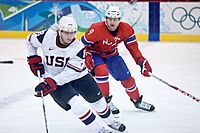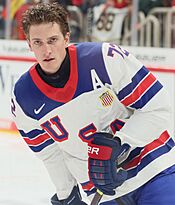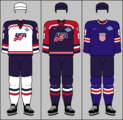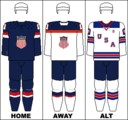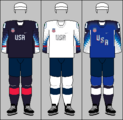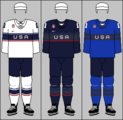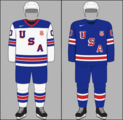United States men's national ice hockey team facts for kids
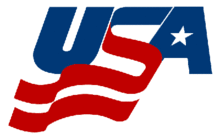 |
|
| Nickname(s) | Team USA |
|---|---|
| Association | USA Hockey |
| General Manager | Jeff Kealty John Vanbiesbrouck |
| Head coach | Ryan Warsofsky |
| Assistants | Kevin Dean Adam Nightingale Mike Vellucci |
| Captain | Clayton Keller |
| Most games | Mark Johnson |
| Most points | Mark Johnson (146) |
| IIHF code | USA |
| IIHF ranking | 4 |
| Highest IIHF ranking | 1 (2025) |
| Lowest IIHF ranking | 7 (2003, 2006–07, 2012) |
| Team colors | |
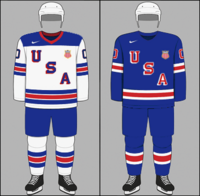 |
|
| First international | |
| United States (Antwerp, Belgium; April 24, 1920) |
|
| Biggest win | |
| United States (St. Moritz, Switzerland; February 1, 1948) |
|
| Biggest defeat | |
| Sweden (Stockholm, Sweden; March 12, 1963) Soviet Union (Stockholm, Sweden; March 15, 1969) |
|
| IIHF World Championships | |
| Appearances | 76 (first in 1920) |
| Best result | |
| Canada Cup / World Cup | |
| Appearances | 8 (first in 1976) |
| Best result | |
| Olympics | |
| Appearances | 24 (first in 1920) |
| Medals | |
| International record (W–L–T) | |
| 580–500–87 | |
| Medal record | ||
|---|---|---|
| Olympic Games | ||
| Gold | 1960 Squaw Valley | Team |
| Gold | 1980 Lake Placid | Team |
| Silver | 1920 Antwerp | Team |
| Silver | 1924 Chamonix | Team |
| Silver | 1932 Lake Placid | Team |
| Silver | 1952 Oslo | Team |
| Silver | 1956 Cortina d'Ampezzo | Team |
| Silver | 1972 Sapporo | Team |
| Silver | 2002 Salt Lake City | Team |
| Silver | 2010 Vancouver | Team |
| Bronze | 1936 Garmisch-Partenkirchen | Team |
| World Championships | ||
| Gold | 1933 Czechoslovakia | |
| Gold | 1960 United States | Team |
| Gold | 2025 Sweden–Denmark | {{{3}}} |
| Silver | 1920 Belgium | Team |
| Silver | 1924 France | Team |
| Silver | 1931 Poland | |
| Silver | 1932 United States | Team |
| Silver | 1934 Italy | |
| Silver | 1939 Switzerland | |
| Silver | 1950 Great Britain | |
| Silver | 1952 Norway | Team |
| Silver | 1956 Italy | Team |
| Bronze | 1936 Germany | Team |
| Bronze | 1949 Sweden | |
| Bronze | 1962 United States | |
| Bronze | 1996 Austria | |
| Bronze | 2004 Czech Republic | |
| Bronze | 2013 Sweden & Finland | |
| Bronze | 2015 Czech Republic | |
| Bronze | 2018 Denmark | |
| Bronze | 2021 Latvia | |
| Canada Cup / World Cup | ||
| Gold | 1996 Montreal | |
| Silver | 1991 Hamilton | |
| Four Nations Face-Off | ||
| Silver | 2025 Boston | {{{3}}} |
The United States men's national ice hockey team is the official team that represents the United States in men's international ice hockey games. This team is managed by USA Hockey, which is the main organization for ice hockey in the U.S. As of May 2025, Team USA is ranked number one in the world by the IIHF World Ranking.
Team USA has won gold medals at the 1960 and 1980 Olympic Games. They also earned silver medals at the 2002 and 2010 Olympics. In 1996, the U.S. team won the 1996 World Cup of Hockey by beating Canada in the final game.
Most recently, in 2025, the team won a historic gold medal at the World Championships. This was their first win in that tournament since 1960, and only their third overall, with the first being in 1933. For many years, the U.S. did not usually send its best NHL players to the World Championships. Instead, they used it as a chance for younger players to get international experience. However, this approach changed in the 2020s.
Overall, the U.S. team has won many medals. They have eleven Olympic medals, including two golds. They also have 21 World Championship medals, with three golds (including the 1960 Olympic win). The team has reached the semi-finals of the Canada Cup/World Cup five times, making it to the finals twice and winning gold once. Before 2025, the U.S. had never reached a World Championship gold medal game. They had lost in the semi-finals twelve times since the IIHF started a playoff system in 1992.
The U.S. is one of the top ice hockey teams in the world. It is part of the "Big Six" group. This unofficial group includes the six strongest men's ice hockey nations: Canada, the Czech Republic, Finland, Russia, and Sweden.
Contents
Team USA's Journey: Key Moments
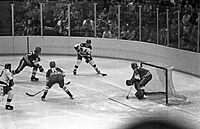
One of the most famous moments for the American ice hockey team is the "Miracle on Ice" from the 1980 Winter Olympics. This happened in Lake Placid, New York. A team of American college players beat the strong, professional team from the Soviet Union. This win helped them earn a gold medal. Even though ice hockey is not the biggest sport everywhere in the United States, the "Miracle" is often called one of America's greatest sports achievements.
The U.S. also won a gold medal at the 1960 Games in Squaw Valley, California. They beat the Soviet Union, Canada, Czechoslovakia, and Sweden on their way to victory. This win is sometimes called the "Forgotten Miracle" because it's not as well-known as the 1980 win.
Growth and Success in Recent Decades
American hockey talent grew a lot in the 1980s and 1990s. Many future NHL stars emerged, like Tony Amonte, Chris Chelios, Brett Hull, Pat LaFontaine, Brian Leetch, and Mike Modano. Even though the U.S. team finished no higher than fourth in major events from 1981 to 1994, they were limited to amateur players back then. Other countries used professionals.
However, the Americans reached the finals of the 1991 Canada Cup and won the 1996 World Cup. Six years later, the International Olympic Committee and NHL worked together to allow NHL players to compete in the Olympics. The U.S. then won a silver medal at the 2002 Winter Olympics. Their team included NHL stars like Adam Deadmarsh, Chris Drury, and Brian Rafalski.
By the 2006 Olympics, many of these older NHL players had retired or were not as strong. The 2006 Olympic team finished 8th. It was a team in transition, with younger NHL players like Rick DiPietro and John-Michael Liles.
The 2010 U.S. Olympic team was much younger and faster. It featured players like David Backes, Patrick Kane, Phil Kessel, and Zach Parise. The team also had strong veterans, including goalie Ryan Miller and captain Jamie Langenbrunner. The U.S. team surprised Canada with a 5–3 win in the first round. They became the top-seeded team. After beating Finland 6–1, the U.S. played Canada again in the gold medal game. They lost 3–2 in overtime, earning the silver medal. This gold medal game was watched by over 27 million U.S. households. It was the most-watched hockey game in America since the 1980 "Miracle on Ice."
Recent Olympic Challenges and Triumphs
The NHL decided not to send its players to the 2018 Olympics. This was due to disagreements over insurance and advertising rules. This put the American team at a disadvantage. More than 31% of NHL players are American. As a result, the U.S. team for 2018 was made up of players from European leagues, minor leagues, and college. The team did not do well, losing to Slovenia and the Olympic Athletes from Russia. They were eliminated by the Czechs in the quarterfinals. The Russian team, made mostly of players from their own KHL league, won the tournament.
In March 2021, Stan Bowman was named general manager for the U.S. Olympic men's hockey team for the 2022 Beijing Games. However, he resigned in October 2021. This happened after an investigation found that he did not report serious misconduct by a team staff member. This failure to report led to further issues.
In February 2024, Bill Guerin became the general manager for the U.S. team. He will lead them in the Four Nations Face-Off and the 2026 Winter Olympics. In May 2024, Mike Sullivan was chosen as the head coach for both events.
On May 25, 2025, Team USA won their first IIHF World Hockey Championship title since 1933. (The 1960 Olympic win is also counted as a world championship, but it wasn't an IIHF tournament). They beat Switzerland in the gold medal game. Tage Thompson scored the winning goal in overtime, securing this historic victory.
Team Roster
Current Players
Here is the roster for the 2025 IIHF World Championship.
Head coach: Ryan Warsofsky
| No. | Pos. | Name | Height | Weight | Birthdate | Team |
|---|---|---|---|---|---|---|
| 1 | G | Jeremy Swayman | 1.91 m (6 ft 3 in) | 88 kg (194 lb) | 24 November 1998 | |
| 2 | D | Jackson LaCombe | 1.88 m (6 ft 2 in) | 93 kg (205 lb) | 9 January 2001 | |
| 6 | D | Mason Lohrei | 1.96 m (6 ft 5 in) | 100 kg (220 lb) | 17 January 2001 | |
| 7 | D | Michael Kesselring | 1.96 m (6 ft 5 in) | 98 kg (216 lb) | 13 January 2000 | |
| 8 | D | Zach Werenski | 1.88 m (6 ft 2 in) | 99 kg (218 lb) | 19 July 1997 | |
| 9 | F | Clayton Keller – C | 1.78 m (5 ft 10 in) | 79 kg (174 lb) | 29 July 1998 | |
| 10 | F | Matty Beniers | 1.88 m (6 ft 2 in) | 82 kg (181 lb) | 5 November 2002 | |
| 12 | F | Shane Pinto | 1.91 m (6 ft 3 in) | 93 kg (205 lb) | 12 November 2000 | |
| 18 | F | Drew O'Connor | 1.93 m (6 ft 4 in) | 95 kg (209 lb) | 9 June 1998 | |
| 19 | F | Cutter Gauthier | 1.88 m (6 ft 2 in) | 91 kg (201 lb) | 19 January 2004 | |
| 20 | D | Andrew Peeke | 1.91 m (6 ft 3 in) | 97 kg (214 lb) | 17 March 1998 | |
| 22 | F | Isaac Howard | 1.80 m (5 ft 11 in) | 86 kg (190 lb) | 30 March 2004 | |
| 23 | F | Mikey Eyssimont | 1.83 m (6 ft 0 in) | 91 kg (201 lb) | 9 September 1996 | |
| 28 | D | Zeev Buium | 1.83 m (6 ft 0 in) | 83 kg (183 lb) | 7 December 2005 | |
| 30 | G | Hampton Slukynsky | 1.88 m (6 ft 2 in) | 84 kg (185 lb) | 2 July 2005 | |
| 35 | G | Joey Daccord | 1.88 m (6 ft 2 in) | 91 kg (201 lb) | 19 August 1996 | |
| 43 | F | Will Smith | 1.84 m (6 ft 0 in) | 82 kg (181 lb) | 17 March 2005 | |
| 47 | F | Michael McCarron | 1.98 m (6 ft 6 in) | 105 kg (231 lb) | 7 March 1995 | |
| 72 | F | Tage Thompson – A | 1.98 m (6 ft 6 in) | 100 kg (220 lb) | 30 October 1997 | |
| 73 | D | Alex Vlasic | 1.98 m (6 ft 6 in) | 98 kg (216 lb) | 5 June 2001 | |
| 76 | D | Brady Skjei – A | 1.91 m (6 ft 3 in) | 95 kg (209 lb) | 26 March 1994 | |
| 81 | F | Josh Doan | 1.88 m (6 ft 2 in) | 90 kg (200 lb) | 1 February 2002 | |
| 83 | F | Conor Garland | 1.78 m (5 ft 10 in) | 75 kg (165 lb) | 11 March 1996 | |
| 91 | F | Frank Nazar | 1.78 m (5 ft 10 in) | 86 kg (190 lb) | 14 January 2004 | |
| 92 | F | Logan Cooley | 1.83 m (6 ft 0 in) | 87 kg (192 lb) | 4 May 2004 |
Award-Winning Players
The IIHF gives out awards at each World Championship. These awards recognize the best goalie, defenseman, and forward. Since 2004, they also give an award for the most valuable player (MVP). Here are some American players who have won these awards:
- 1955 – Don Rigazio (Best Goalie)
- 1956 – Willard Ikola (Best Goalie)
- 1959 – Bill Cleary (Best Forward)
- 1960 – Jack McCartan (Best Goalie)
- 1962 – John Mayasich (Best Defenseman)
- 1967 – Carl Wetzel (Best Goalie)
- 2004 – Ty Conklin (Best Goalie)
- 2014 – Seth Jones (Best Defenseman)
- 2018 – Patrick Kane (MVP)
- 2021 – Cal Petersen (Best Goalie)
- 2025 – Zach Werenski (Best Defenseman)
Team Uniforms Through the Years
- National team uniforms
More About Team USA Hockey
- List of United States national ice hockey team rosters
- List of Olympic men's ice hockey players for the United States
See also
 In Spanish: Selección de hockey sobre hielo de Estados Unidos para niños
In Spanish: Selección de hockey sobre hielo de Estados Unidos para niños


